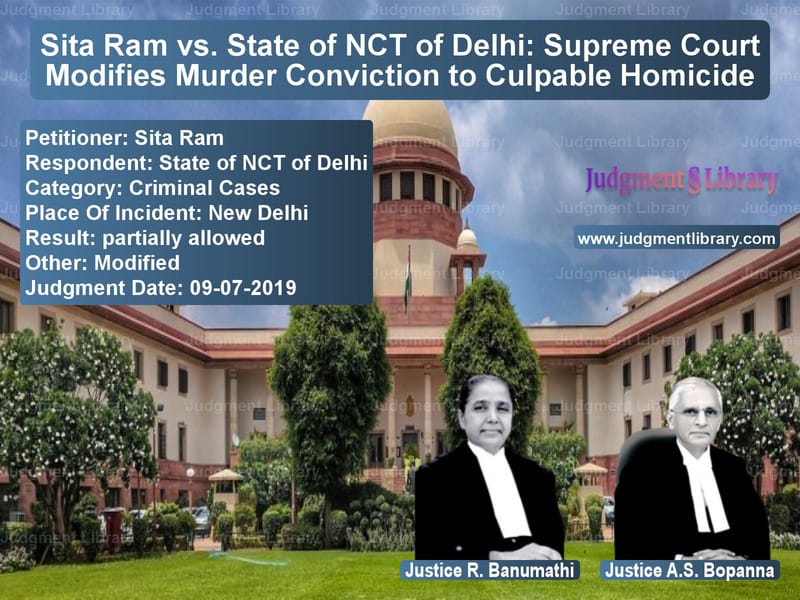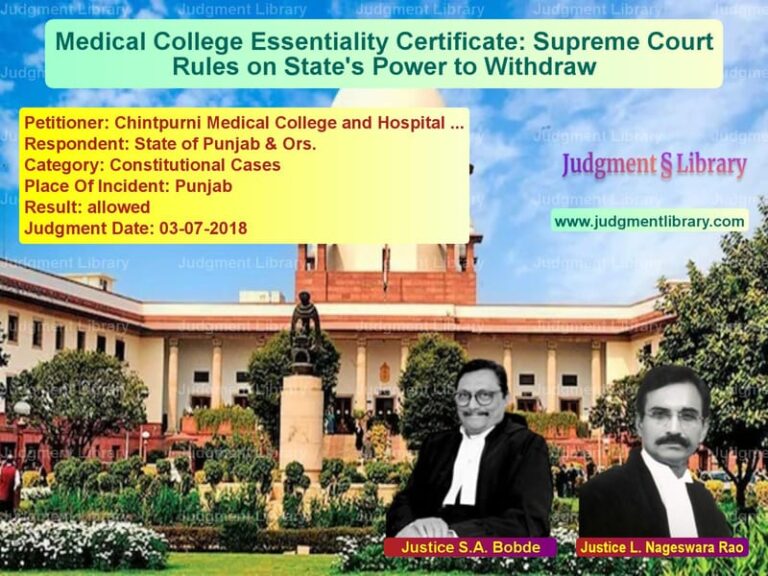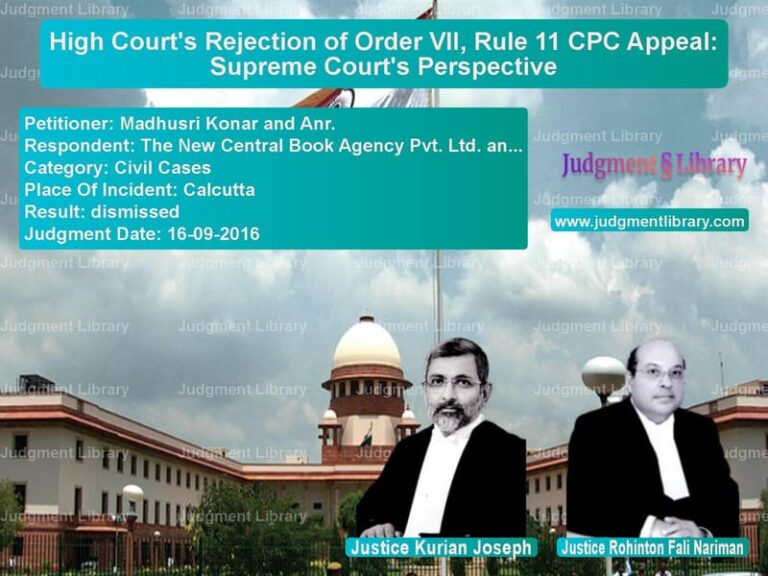Sita Ram vs. State of NCT of Delhi: Supreme Court Modifies Murder Conviction to Culpable Homicide
The case of Sita Ram vs. State of NCT of Delhi is a significant legal matter that explores the distinction between murder and culpable homicide under the Indian Penal Code (IPC). This case, which originated in 1990 and reached the Supreme Court in 2019, highlights the importance of determining intent, premeditation, and the suddenness of an attack in classifying a crime.
On July 2, 1990, at approximately 10:00 p.m., Mangal Singh and his wife, Kala Wati, were returning home after closing their tea shop. When they passed near the shop of Girdhari Lal (A-1), Mangal Singh objected to the illegal tapping of electricity by the accused. This minor dispute quickly escalated into a heated argument and eventually turned violent. The accused, including Sita Ram (A-2), Ram Pal (A-3), and Ram Phal (A-4), attacked Mangal Singh with a hockey stick and a danda (wooden staff). His wife and other bystanders who attempted to intervene also suffered injuries.
Background of the Case
The case was initially registered under Sections 147, 148, 307, and 323 of the IPC, but following Mangal Singh’s death, the charges were altered to Section 302 IPC. The prosecution presented multiple eyewitnesses, including injured witnesses such as Mangal Singh’s wife and son. Based on the evidence, the Trial Court convicted Sita Ram under Section 302 read with Section 34 IPC, sentencing him to life imprisonment.
Legal Issues at Stake
- Was the crime premeditated or a result of a sudden fight?
- Does the attack fall under the purview of murder (Section 302 IPC) or culpable homicide not amounting to murder (Section 304 IPC)?
- Was the attack committed in a cruel and unusual manner?
- Should the accused receive a reduced sentence based on the nature of the altercation?
Petitioner’s Arguments
Mrs. Bharti Tyagi, representing the appellant, argued the following points:
- The incident was a result of a sudden fight and was not premeditated.
- The accused did not carry weapons in advance; they picked up a hockey stick and danda during the quarrel.
- There was no deliberate intention to kill Mangal Singh; the attack occurred in a moment of heated passion.
- The case falls under Exception 4 to Section 300 IPC, which pertains to culpable homicide, not murder.
- The injuries inflicted, though serious, were not excessive to suggest that the accused acted with the intent to kill.
Respondent’s Arguments
The Additional Solicitor General, Mr. K.M. Natraj, appearing for the State, countered with the following arguments:
- The accused were fully aware that striking a person’s head with a hockey stick and danda could result in death.
- The nature and severity of the injuries indicated an intention to cause fatal harm.
- Even if the attack was sudden, the accused continued assaulting Mangal Singh, showing recklessness towards his life.
- The Trial Court and the High Court had both correctly applied the law in convicting the appellant under Section 302 IPC.
Supreme Court’s Observations
The Supreme Court, with a bench comprising R. Banumathi and A.S. Bopanna, re-examined the evidence and the circumstances of the incident. The Court noted the following:
- The crime was committed without prior planning or premeditation.
- The dispute originated from a minor quarrel over electricity tapping.
- Both the accused and the deceased engaged in the fight spontaneously.
- The weapons used were picked up in the heat of the moment, rather than carried in anticipation.
- Although Mangal Singh suffered multiple injuries, only three were fatal.
- There was no evidence suggesting that the accused acted in a cruel or unusual manner.
Critical Judgment Excerpt: “The occurrence was without premeditation and sudden fight between the parties started in the heat of passion upon a sudden quarrel. The appellant-Sita Ram (A-2) was not pre-armed and other accused were also not pre-armed. Though, deceased-Mangal Singh has sustained as many as nine injuries, except injuries no.1 to 3 which are the injuries caused on the head and all other injuries are on the hand, shoulder, arms etc.”
Final Verdict
Considering all factors, the Supreme Court ruled that the case fell under Exception 4 to Section 300 IPC, which applies when:
- The crime was committed without premeditation.
- It occurred in a sudden fight in the heat of passion.
- The offender did not take undue advantage or act in a cruel manner.
The Court modified the conviction from Section 302 IPC (murder) to Section 304 Part II IPC (culpable homicide not amounting to murder). Sita Ram was sentenced to rigorous imprisonment for eight years. The appeal was thus partially allowed.
Legal Implications of the Judgment
This ruling serves as an important precedent in criminal law by reinforcing the distinction between murder and culpable homicide. The case highlights several key legal principles:
- Not all fatal attacks qualify as murder; circumstances and intent are crucial considerations.
- Premeditation is a significant factor in determining the severity of punishment.
- Sudden quarrels and heated exchanges can lead to reduced culpability under Exception 4 to Section 300 IPC.
- Courts must carefully analyze whether an attack was committed with undue advantage or excessive cruelty.
Impact on Future Cases
The judgment emphasizes the need for a nuanced approach in criminal cases involving sudden altercations. Defense counsels in similar cases may argue that their clients acted in the heat of the moment, while prosecution teams will aim to establish premeditation and intent to secure harsher sentences.
The ruling also serves as a reminder for law enforcement to properly assess the circumstances of each case before framing charges. Cases where a sudden fight escalates should be distinguished from planned murders to ensure just sentencing.
In conclusion, the Sita Ram vs. State of NCT of Delhi case provides clarity on the application of Section 300 IPC’s exceptions and serves as a valuable legal precedent for future cases involving sudden fights leading to homicide.
Petitioner Name: Sita Ram.Respondent Name: State of NCT of Delhi.Judgment By: Justice R. Banumathi, Justice A.S. Bopanna.Place Of Incident: New Delhi.Judgment Date: 09-07-2019.
Don’t miss out on the full details! Download the complete judgment in PDF format below and gain valuable insights instantly!
Download Judgment: Sita Ram vs State of NCT of Delh Supreme Court of India Judgment Dated 09-07-2019.pdf
Direct Downlaod Judgment: Direct downlaod this Judgment
See all petitions in Murder Cases
See all petitions in Judgment by R. Banumathi
See all petitions in Judgment by A. S. Bopanna
See all petitions in partially allowed
See all petitions in Modified
See all petitions in supreme court of India judgments July 2019
See all petitions in 2019 judgments
See all posts in Criminal Cases Category
See all allowed petitions in Criminal Cases Category
See all Dismissed petitions in Criminal Cases Category
See all partially allowed petitions in Criminal Cases Category







